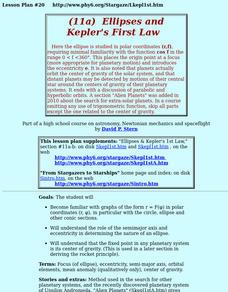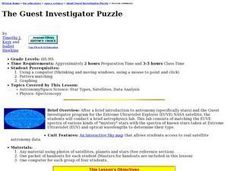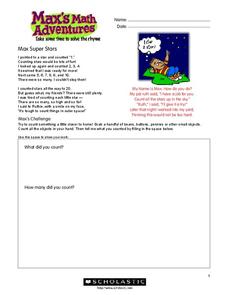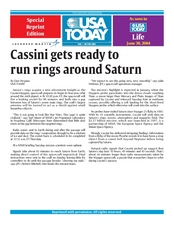Curated OER
Using the Internet
In this using the internet learning exercise, students search several websites to review information about the heart, human senses, the solar system, and planets. Students also read information about the rock cycle and answer provided...
Curated OER
How Big Are Earth, Sun, and Moon?
Third graders draw what they believe is in space on a dry erase board. In groups, they are given a beaker half filled with water and they add a teaspoon of oil, observing the different layers that form. To end the lesson, they identify...
Curated OER
Our Solar System
Students analyze the theories of the formation of the universe and solar system. Students analyze planetary motion and the physical laws that explain that motion: Rotation, Revolution, Apparent diurnal motions of the stars, sun, and...
Curated OER
Australian Aboriginal People: A Fun Introduction
Students read from a book of poems titled, "Ann the Goanna," and discuss the concept of indigenous people with the teacher. Students answer questions about specific poems read, using a final poem titled, "Reconciliation" to discuss the...
Curated OER
Spinning into Space
Students, through hands-on activities, teacher demonstrations, pictures, and informational books, complete a unit on the Earth and its place in the Universe. They make mobiles of the Milky Way and watch demonstrations of lunar and solar...
University of Colorado
The Jovian Basketball Hoop
Can you listen to Jupiter on a simple radio? Turns out the answer is yes! The resource instructs scholars to build a simple radio to pick up the radio waves created when the charged particles from the sun hit Jupiter's magnetic...
Curated OER
Planetary Orbits
Students explore space science by completing a solar system identification worksheet. In this planets lesson, students discuss the different planets in our star system and identify their traits. Students complete an orbital system...
Curated OER
Astronomy
In this astronomy worksheet, students find fifty one words in a word search that are related to comets, galaxies, planets, moons, stars and the tides.
Curated OER
Introduction to Constellations
Students examine constellations. In this astronomy lesson plan, students study various constellations and identify five major constellations. They will construct a model of one of the constellations.
Curated OER
Constellations
Middle schoolers explore the major constellations. After reviewing the Earth's basic motions and their significance, students discuss the moon's orbit and revolutions. Using a Digitarium Alpha portable planetarium projector, they...
Curated OER
Space Search
In this space activity, students identify and locate vocabulary terms and names related to space. There are 26 words located in the puzzle.
Curated OER
Moons
Students practice rote counting to 20. After a lecture about the planets and the moons that surround them, they identify the number of moons surrounding various planets. Students compare and contrast the quantity of moons surrounding...
Curated OER
Ellipses And Kepler's First Law
Learners explain that planets actually orbit the center of gravity of the solar system, and that distant planets may be detected by motions of their central star around the centers of gravity of their planetary systems.
Curated OER
Space Trader And Economics
Students' play a game applying different economic and game terms. In the game, the students' are to travel to 4 planets which provide the best resources for increasing their money to purchase a moon in the end. The students' keep track...
Curated OER
The Celestial Sphere
High schoolers are introduced to the celestial sphere, describing its apparent rotation and the special role of the pole star.
Curated OER
Mother Earth - Father Sky
Third graders research and write about Cyrus Dillan. They explain one of Dillan's sculptures. Students locate six constellations and two planets. They research and write about the daily life of the Pawnee.
Curated OER
The Guest Investigator Puzzle
Students conduct a brief astrophysics lab matching the EUVE spectra of various kinds of "mystery" stars with the spectra of known stars taken at Extreme Ultraviolet and optical wavelengths to determine their type.
Curated OER
Max's Math Adventures
In this counting practice activity, students read the story rhyme about counting practice. Students count a handful of objects they find in their home. Students then count the objects illustrated in each picture set. Students also draw...
Curated OER
Astronomy 1 Quiz- Online Interactive
For this space science worksheet, students complete 5 multiple choice questions pertaining to the planets and other space bodies. This is an online interactive quiz. Prior knowledge is assumed.
Curated OER
The Path of the Sun, the Ecliptic
High schoolers are introduced to the ecliptic, the zodiac and the apparent motions of the Sun, Moon and planets across the sky.
Curated OER
The Solar System
For this crossword puzzle worksheet, students read the 20 clues about the solar system. Students then complete the puzzle with 20 words related to the solar system.
Curated OER
As the World Turns
Third graders read books and participate in class discussions about the motion of the stars and planets and moons in relation to the Earth. In small groups, 3rd graders act out these movements to music.
Curated OER
Three D Constellations
Students are introduced to both celestial coordinates and to the first rung on the distance determination ladder. They convert spherical coordinates to Cartesian coordinates to construct a three dimensional model of a constellation...
Curated OER
Cassini gets Ready to run Rings Around Saturn
Fourth graders study an article about Saturn. In this investigative lesson students discuss the article and complete an activity that asks them what question they would pose about Saturn.
Other popular searches
- Space, Stars and Planets
- The Stars and Planets
- Stars and Planets Worksheets
- Compare Stars and Planets
- Stars and Planets Puzzles
- Space Stars and Planets
- Space\, Stars and Planets
- Planets and Stars
- Comparing Planets and Stars
- Space\\, Stars and Planets
- Planets Stars

























